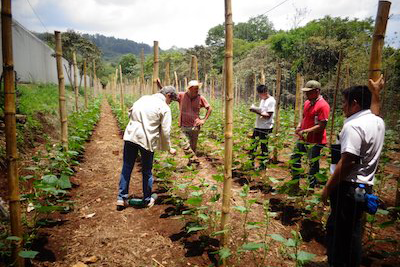
Farmers from Morazán in northeast El Salvador are facing agriculture challenges that impact their bottom line. They need agrochemicals to control pests and fertilize their crops, but inputs are costly. Without them, their produce and livelihoods are at risk. AEPAN Morazán, a farmer’s association with 22 members, supplies the national market with chayote, cucumber, cabbage, string beans, pepper, garlic, onion and tomatoes.
Thanks to learning activities from Matilde Paino D’Urzo, the first Farmer-to-Farmer volunteer in El Salvador in 2019, farmers are now better equipped to protect their crops from pests and disease.
Despite supplying a 70 percent share of El Salvador’s formal market, AEPAN Morazán lacks adequate technical assistance to improve its production. Members of AEPAN Morazán typically rely on technical support from just one agronomist in the region via the nonprofit organization ADEL Morazán. This organization supports economic development in Morazán, in addition to singlehandedly overseeing diverse crops.
In response to these challenges, and to complement existing development programs in Morazán, NCBA CLUSA developed a volunteer assignment to teach farmers how to practice Integrated Pest Management (IPM) as a strategy to manage pests in the most cost-effective, environmentally-sound and socially-acceptable manner.
D’Urzo, a veteran Farmer-to-Farmer volunteer, was selected for this assignment to offer hands-on training. The assignment was originally designed to address the needs of AEPAN Morazán’s members. However, D’Urzo also participated in the monthly horticulture board meeting organized by ADEL Morazán during her assignment, allowing her to ultimately train additional farmers who were not initially part of the intervention. D’Urzo’s trainings included both lectures and hands-on activities to cover different approaches to plant protection.
In total, D’Urzo raised awareness among 33 farmers on sanitation procedures to reduce phytosanitary problems and techniques to promote and protect soil health from pests. She also taught trainees how to properly manage crop residues and discussed robust IPM approaches, such as mechanical pest controls and pest monitoring techniques. Biocontrol alternatives and responsible use of pesticides were also topics she addressed.
Two months after the assignment, farmers were already using some of the techniques they learned from D’Urzo. Members of the Asociación Cooperativa de Producción y Comercialización Agropecuaria El Limón (ACOELI), who also attended the trainings, are now preparing “fast compost” to use as a fertilizer for their crops. Fast compost enriches soil more affordably than a chemical fertilizer would. Members are also managing their crop residues in a responsible way to avoid pest outbreaks. Rather than throwing crop residues out, farmers now compost them for future use as fertilizer.
Already, farmers are seeing results. “Our cabbage is greener and more robust,” said Meyvi Mendez, a member of ACOELI.
Already, farmers are seeing results. “Our cabbage is greener and more robust,” said Meyvi Mendez, a member of ACOELI.
It’s this “people helping people” aspect of Farmer-to-Farmer that keeps D’Urzo coming back year after year to volunteer her time and energy.
Funded by the U.S. Agency for International Development (USAID), NCBA CLUSA’s Farmer-to-Farmer program sends American farmers and agribusiness professionals on 2-3 week development assignments, promoting sustainable economic growth and agricultural development worldwide.


